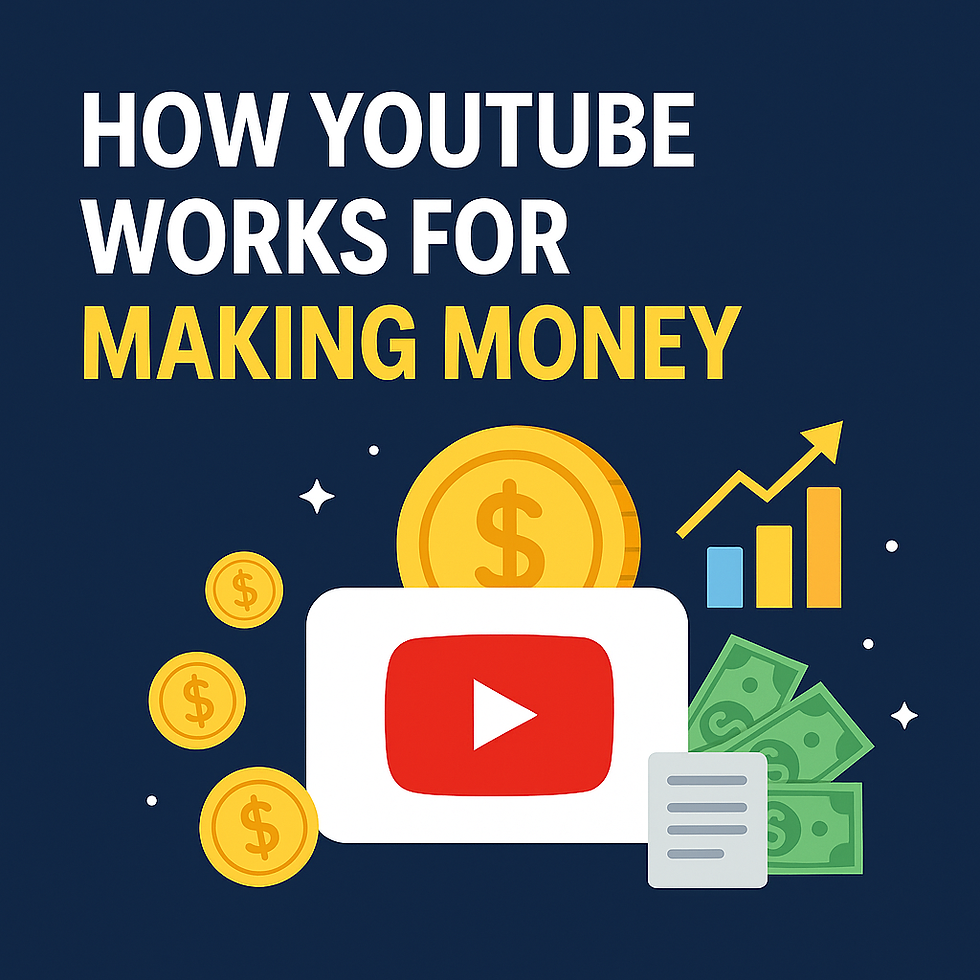How AI is Dominating the YouTube Industry: The Future of Content Creation.
- Manoj Manju
- Aug 5
- 4 min read

In the ever-evolving world of digital media, YouTube stands as a titan, hosting over 500 hours of content uploaded every minute. But what’s quietly revolutionizing this landscape behind the scenes is not just talent or camera quality — it’s Artificial Intelligence (AI). From creators to marketers, everyone is leveraging AI to gain a competitive edge. AI is no longer a supporting tool — it's dominating the YouTube industry in ways we couldn’t have imagined a decade ago.
1. AI in Content Creation: From Scripts to Videos
One of the most significant breakthroughs is AI-powered content creation. Platforms like ChatGPT, Jasper, and Copy.ai help YouTubers generate engaging, SEO-optimized scripts within minutes. No longer do creators need to spend hours researching or structuring their content — AI handles ideation, scripting, tone adjustment, and even humor injection with ease.
Tools like Pictory, Synthesia, HeyGen, Runway, and Google Veo go a step further. They transform written scripts into fully edited videos, complete with stock footage, subtitles, transitions, and even AI-generated avatars or voiceovers. This allows even non-video editors or camera-shy individuals to create professional-quality content at scale — at a fraction of the cost and time.
2. AI Voiceovers & Avatars: Say Goodbye to Microphones
Thanks to text-to-speech engines like ElevenLabs, WellSaid Labs, and LOVO.ai, creators can now produce studio-grade voiceovers in multiple accents, genders, and languages. This removes the need for microphones, recording setups, or voice actors.
Virtual YouTubers (VTubers) powered by AI-generated avatars are also on the rise. These avatars, driven by real-time facial and voice recognition, entertain millions without ever revealing the creator’s identity. This blend of anonymity and charisma has created a new genre of influencers altogether.
3. AI Video Editing: Speed, Precision, and Creativity
Video editing, traditionally a time-consuming process, is being drastically transformed by AI. Tools like Adobe Premiere Pro’s Sensei, Runway ML, and Magisto offer features such as automatic scene detection, background removal, noise reduction, and smart B-roll insertion.
Creators can now automatically generate highlight reels, reels, or shorts from long-form content using AI — a massive boost for content repurposing and cross-platform distribution (YouTube Shorts, Instagram Reels, TikTok, etc.).
4. AI-Powered SEO and Thumbnails
In a saturated platform like YouTube, discoverability is everything — and AI is redefining how creators optimize for the algorithm.
TubeBuddy, VidIQ, and Morningfame use AI to suggest keywords, titles, tags, and video topics with high traffic and low competition.
AI-generated thumbnails, created using tools like Canva AI or Adobe Firefly, are now designed to maximize click-through rates by analyzing trends and visual engagement patterns.
Predictive analytics help estimate potential performance of a video before it's published.
This empowers creators to make data-driven creative decisions, increasing visibility and audience retention.
5. AI in YouTube Automation and Channel Management
AI isn’t just helping with content — it’s streamlining the entire channel operation process. Services now exist that offer fully automated YouTube channels, where AI handles:
Topic research
Script generation
Voiceover
Video editing
SEO optimization
Thumbnail design
Upload scheduling
This has given rise to “faceless YouTube channels”, where the creator does nothing but collect revenue, turning YouTube into a truly passive income stream — all powered by AI.
6. Audience Analytics and Engagement
Understanding your audience is critical, and AI helps dissect user behavior better than any manual tool.
YouTube's own algorithm uses machine learning to optimize video recommendations, but tools like Google Analytics, Hootsuite AI, and Brandwatch help creators:
Analyze watch time and bounce rate
Determine ideal upload times
Track audience interests and sentiment
Personalize content based on viewer preferences
Creators can even use AI chatbots for comment moderation and automated community engagement, saving hours of manual work while maintaining a personal touch.
7. The Rise of AI-Generated Influencers
The next big trend is already here — AI-generated influencers. These are fully virtual personalities, often powered by neural networks, who have their own YouTube channels, social presence, and loyal fanbases. Brands collaborate with them for marketing, just like they would with real creators.
This trend blurs the line between creator and creation. From Lil Miquela to Kizuna AI, these virtual personalities prove that AI can not only assist but be the creator.
The Pros and Concerns: Is AI a Double-Edged Sword?
✅ Advantages:
Cost-effective video production
Scale content creation without burnout
No technical or on-camera expertise needed
Faster turnaround and higher consistency
Global reach with multilingual AI capabilities
⚠️ Challenges and Ethical Concerns:
Lack of human emotion or creativity in some AI content
Over-saturation of low-quality automated videos
Copyright and originality issues
Viewers’ increasing skepticism about AI-made content
Job displacement among editors, voice artists, and writers
Final Thoughts: AI is Not the Future — It’s the Present
The dominance of AI in the YouTube industry is undeniable. Whether you’re a solo creator, an agency, or a passive investor in digital content, AI offers tools that can elevate your channel or even run it entirely.
However, the creators who win in this new era will be those who balance automation with authenticity. The future isn’t about humans vs. AI — it’s about humans with AI.
YouTube is changing fast. With AI by your side, you’re not just keeping up — you’re leading the charge.




Comments